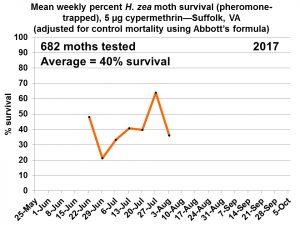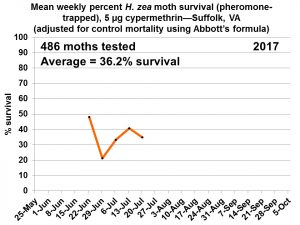Black light trap catches of corn earworm (aka bollworm) moths increased at most reporting stations, ranging from 5 to 58 per night this week. The pheromone traps at Suffolk also caught about 20 moths per night. Mike Arrington reported that he was seeing cotton fields (Bt and conventional) very close to egg threshold for bollworm in Suffolk and Southampton Counties.
Brown marmorated stink bugs ranged from zero to 1.7 per night. The data tables for corn earworm and BMSB are here: BLT_3_Aug_2017
Corn earworm moth survival in the cypermethrin vial tests was 36% for the week, and 40% for the seasonal average (to date). 

